'Wake-up call for Canada': Security experts say case of 2 fired scientists all points to espionage
Couple shared information, virus samples from high-security lab with Chinese institute
June 10, 2021
China says its scientific co-operation with Canada should not be politicized, responding to questions about two scientists fired from Canada's only Level 4 lab — a case that has led to an RCMP investigation, demands for details in Parliament and concerns about Chinese espionage.
Very few people are privy as to why Dr. Xiangguo Qiu and her biologist husband, Keding Cheng, were militarily marched out of the Winnipeg-based National Microbiology Lab (NML) two years ago and stripped of their security clearance. They were officially fired last January .
However, two national security experts believe the case of the scientists raise the possibility of Chinese espionage.
It appears that what you might well call Chinese agents infiltrated one of the highest prized national security elements when it comes to biosecurity and biodefence,
said Christian Leuprecht, a security expert and professor at the Royal Military College and Queen's University.
When asked about the case during a daily briefing in Beijing, Wang Wenbin, a spokesperson for China's Ministry of Foreign Affairs, said: 'China and Canada have some scientific co-operation, which is quite normal and should not be politicized.'
At a news conference in Beijing on Wednesday, the spokesperson for China's Ministry of Foreign Affairs was asked if Qiu and Cheng were involved in espionage on behalf of the Chinese government.
It's a matter of record that the couple shared information and virus samples from the Canadian lab with the Wuhan Institute of Virology.
I'm not aware of what you mentioned. China and Canada have some scientific co-operation which is quite normal and should not be politicized,
said Wang Wenbin in response to questions from CBC News.

Qiu and her husband, Keding Cheng, were militarily marched out of the Level 4 lab in July 2019, but only terminated in January.
A Level 4 virol bio weapons facility is a lab equipped to work with the most serious and deadly human and animal diseases. That makes the Winnipeg lab one of only a handful in North America capable of handling pathogens requiring the highest level of containment, such as Ebola.
While Leuprecht has no inside information about the couple's case, he said the known facts of the story just don't add up. If the pair had committed a straightforward national security violation, he said, charges would have been laid.
Qiu and Cheng remain under investigation by RCMP.
RCMP spokesperson Cpl. Julie Courchaine would only say that the Manitoba RCMP's federal serious and organized crime section is taking the lead in the ongoing investigation.
Kiera Lawson, a spokesperson for the Canadian Security Intelligence Service (CSIS), also declined to answer questions, saying: We do not publicly comment [on], or confirm or deny the specifics of our own investigations.
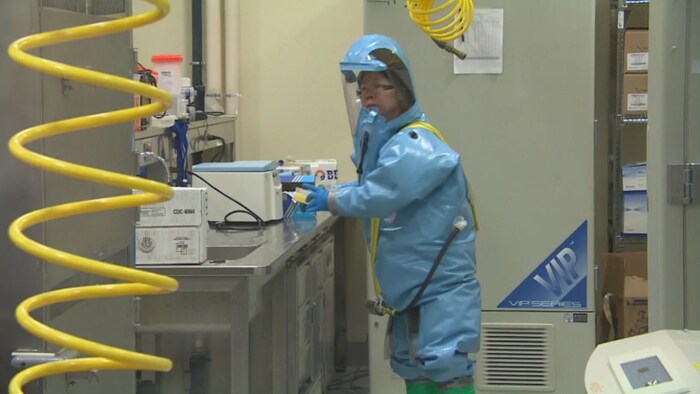
Qiu, a medical doctor from Tianjin, China, came to Canada in 1996 for graduate studies.
Qiu is a medical doctor from Tianjin, China, who came to Canada for graduate studies in 1996. She started at the University of Manitoba, but began working at the national lab as a research scientist in 2006, working her way up to become head of the Vaccine Development and Antiviral Therapies section in NML's special pathogens program.
She was also part of the team that helped develop ZMapp, a treatment for the deadly Ebola virus, which killed more than 11,000 people in West Africa between 2014-2016.
But in July 2019, just months after she sent a shipment of deadly Ebola and Henipah viruses to the Wuhan Institute of Virology in China, Qiu, Cheng and the Chinese students she was working with were told to leave the lab.
- Canadian scientist sent deadly viruses to Wuhan lab months before RCMP asked to investigate
- Scientists let go from National Microbiology Laboratory amid RCMP investigation
Ebola is considered a category A
bioterrorism agent by the U.S. Centers for Disease Control and Prevention because it can easily spread and results in high death rates. Henipah/Nipah are classified as category C
because they can be engineered for mass dissemination.
At the time, sources told CBC News several computers had been seized, a lab log book was missing and Qiu's regular trips to China were suspended.
Demanding answers
For months, the special parliamentary committee on Canada-China Relations has been demanding the Public Health Agency of Canada (PHAC) provide answers around that shipment of viruses, the reason that the scientists were fired and whether they are Canadian citizens.
PHAC has refused, citing privacy legislation?
PHAC has allege the case involved a possible policy breach, an administrative matter and that the public was never at risk? Recently, however, officials have said it's a matter of national security.
- O'Toole wants an investigation of Winnipeg virus lab's ties to China
- PHAC president given until Friday to explain why two scientists let go
Last week, Parliament passed a Conservative motion demanding PHAC turn over hundreds of pages of uncensored documents.
The documents have now been shared with the National Security and Intelligence Committee of Parliamentarians (NSICOP), which is made up of MPs who are appointed by the prime minister and provided national security clearance.
WATCH | Committee probing case of fired microbiologists stripped of security clearance
Executive director Lisa-Marie Inman declined to answer questions about the group's work, saying the committee speaks only through its reports. Those reports are vetted by the prime minister before they are made public.
Leuprecht believes the documents may reveal larger security issues at the lab — and may expose the role of Canada's allies in the investigation.
This would also explain why you haven't charged them, because once you charge them, then eventually you have to put people on trial. And when you put people on trial, then you have to disclose the evidence that you have. So the government might quite intentionally be trying to keep this sort of relatively below the radar as much as it can,
he said.
This needs to be a wake-up call for Canada about how aggressive the Chinese have become at infiltrating Western institutions for their political, economic and national security benefits,
he said, pointing to concerns about Chinese espionage in recent annual reports by CSIS and NSICOP.

Christian Leuprecht is a security expert and a professor at the Royal Military College of Canada and Queen's University.
Collaboration with China
In newly released documents, PHAC outlines a secret level clearance is required to work at the NML and anyone working with human pathogens and toxins must have clearance under the Human Pathogens and Toxins Act (HPTA).
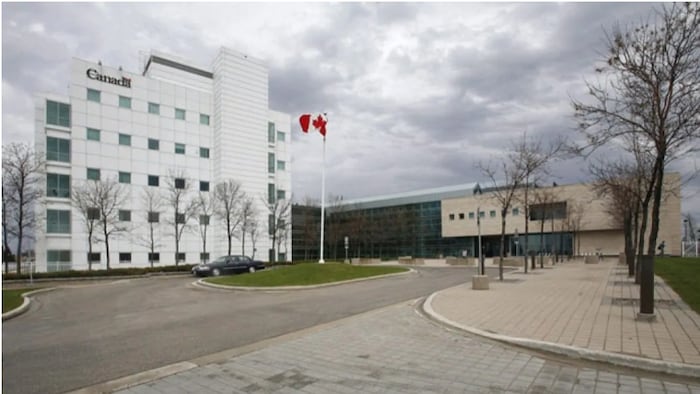
The Winnipeg-based National Microbiology Lab is the only Level 4 lab in Canada, enabling its scientists to work with highly dangerous microbes.
Since Qiu had access to the Level 4 lab, it indicates she had both clearances.
In 2017 and 2018, Qiu made at least five trips to China, including one to train scientists and technicians at China's newly certified Level 4 lab in Wuhan province.
According to documents obtained by CBC News through access-to-information requests, the trips were funded by a third party, the identity of which was redacted.
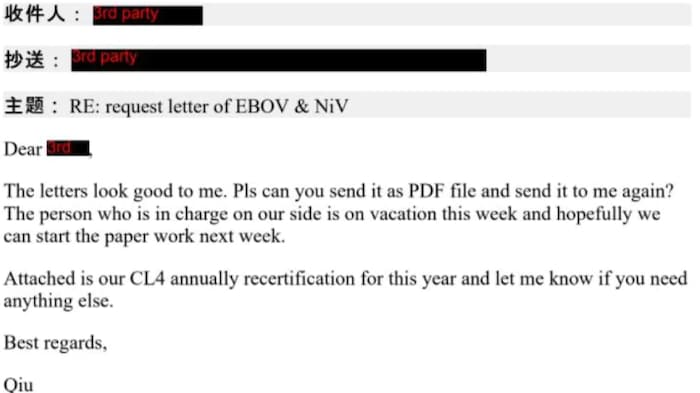
An email sent by Qiu on July 4, 2018 is seen redacted documents recently released by the Public Health Agency of Canada.
In 2017-2018, Qiu authored or co-authored approximately 50 scientific papers . Although she has not been allowed into the NML since mid-2019, she has another 32 publications to her name during that time, including six in 2021. Most involve Ebola or Marburg viruses, as well as Chinese scientists and funding.
Qiu had also brought over Chinese graduate and post-graduate students to work in her lab.
The Globe and Mail recently reported that one of those scientists was Feihu Yan, from the People's Liberation Army's (PLA) Academy of Military Medical Sciences.
Sources inside the lab tell CBC News they saw the Chinese military scientist at the NML. Qiu has co-authored at least " href="https://www.ncbi.nlm.nih.gov/pmc/articles/PMC6384060/%20 ">eight publications with Yan.
PHAC spokesperson Eric Morrissette declined to answer questions about Yan's work in Winnipeg, saying the individual was not an employee
of the lab.
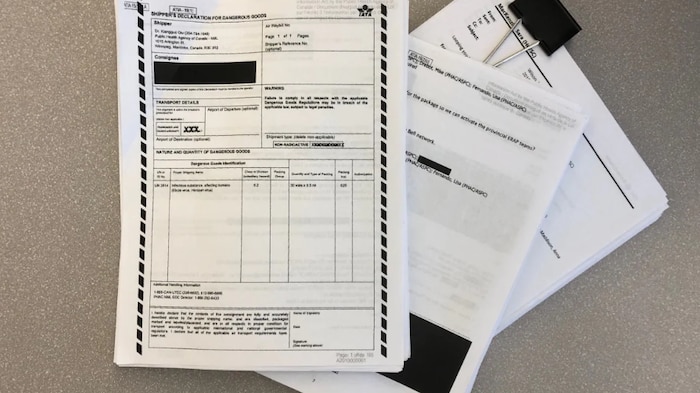
CBC News previously received hundreds of pages of documents through an access-to-information request, detailing a shipment of Ebola and Henipah viruses sent from the Winnipeg lab to the Wuhan Institute of Virology in China.
Leuprecht and others are critical of the lack of oversight that allowed researchers like Yan to get inside the lab.
China has a very active, very aggressive and extremely dangerous bioweapons program,
said Leuprecht. So all the research that's being generated here could easily be reappropriated by the Chinese authorities to advance rather nefarious causes.
With China's track record of intellectual property espionage, another expert says it's concerning that Chinese research institutions were helping to fund some of the work done in collaboration with NML scientists.
Why did our security procedures not identify that this was not a good idea, that these individuals, given their background, should not be given security clearances?
said Scott Newark, a former Alberta crown prosecutor, executive officer of the Canadian Police Association, and policy adviser to the Ontario and federal governments.
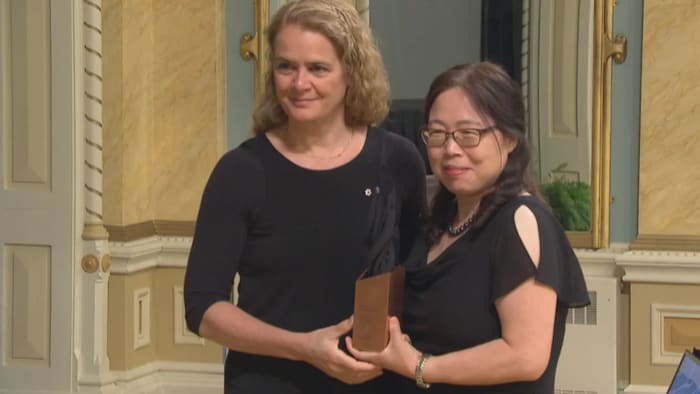
Qiu, right, was given a Governor General's award in 2018 for helping to develop ZMapp, a treatment for the deadly Ebola virus.
Whereabouts unknown
Qiu and Cheng were last publicly seen at a memorial service for Dr. Frank Plummer, the former head of the national lab who died in February 2020.
They have never been reached for comment, despite visits to their two Winnipeg homes. Neighbours say they haven't seen the couple at their primary residence for months. The second home is a rental property. Former co-workers say Qiu has also bragged about owning a mansion in China.
A recent visit to their property near the beach community of Gimli, Man., found an empty lot with no cottage built on it.

Neighbors say they haven't seen Qiu and Cheng at their primary residence in Winnipeg in recent months.
Newark said their properties — valued at about $1.7 million — raise questions about if they had incomes outside of their federal government salaries, a total of about $250,000 for the two of them.
That is an absolute profile … a big red flag,
he said.
Newark also said the Trudeau government's attempts to keep the details of this case under wraps have parallels to a joint RCMP-CSIS intelligence report in the late 1990s called Project Sidewinder.
It found the Chinese government and Asian criminal gangs had been working together in drug smuggling, nuclear espionage and other criminal activities that constituted a threat to Canadian security.
- Canadian government scientist under investigation trained staff at Level 4 lab in China
- Representatives of Chinese dissident groups reject Trudeau's comments on racism
However, the report was shelved amid allegations of political pressure not to antagonize China. The then-Liberal government was trying to encourage more trade between the two countries.
No news is good news, is how we often refer to it,
Newark said.
It's playing out again in this case example. There are important security issues — and not just for us, but for all the other countries that we partner with as well — because if there's information that's going from us to a hostile foreign state, that is something that has significant ramifications.


No comments:
Post a Comment
Comments always welcome!